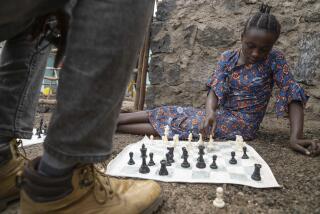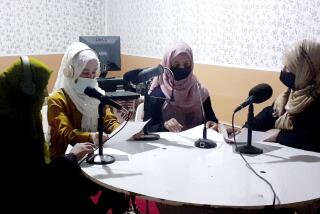Congo Radio Station Is in Tune With Isolated Region
- Share via
BUNIA, Congo — After a long day begging on the streets, Agenong’a Munguromo presses a small radio to his ear for the latest Congolese and Western music from a local FM station that also relays satellite radio broadcasts to this battered provincial capital.
“I spent many days begging and saving to buy this radio,” the 11-year-old whispers, trying not to wake the other homeless children huddled for warmth in front of a shop. “It is my only prized possession.”
A radio is indeed a prize in a town where newspapers were last printed in the 1980s, a cellphone network is just a few months old and recent looting by tribal militiamen destroyed just-opened access to the Internet.
Radio Canal Revelation offers just about the only access to the outside world for the 100,000 people of Bunia. The northeastern town is largely cut off from the rest of this vast central African nation by fighting in the region between the Hema and Lendu tribes.
The broadcasts have made the station’s founder, Richard Pituwa, 28, a popular figure. He does it with just three battered audiocassette players, a satellite receiver, a sound mixer, three microphones and a homemade transmitter that he operates in the pantry of a house.
Many people initially dismissed Pituwa’s efforts, predicting that the station wouldn’t last a month. But two years later, the town’s only private station is still providing music and news. The United Nations also operates a station, as does the local government.
There are no figures on radio listenership or ownership in Bunia, but many residents carry small radios with them.
Despite its name, Radio Canal Revelation has no religious ties or content. Pituwa says its purpose is “to inspire young people to live positively.”
With his left hand on the mixer and his right queuing up a cassette player, Pituwa produces music and other programs in French, Lingala and Kiswahili. One of his biggest problems is Bunia’s frequent power cuts.
“We have a generator but no money to buy petrol,” he said. “A liter of petrol costs $2, and we make less than $5 a day. We can’t afford to use almost half our daily revenue to buy fuel that would give us only 1 1/2 hours of power.”
The station, which has a daily operating cost of $16, is kept afloat by donations and volunteer labor.
“The equipment was bought from people who were happy to sell us broken machines. The engineer repaired them,” he said. The only new machines are the CD player and the Worldspace satellite radio receiver we use to relay news from international broadcasters, he said.
Sold by a businessman in Butembo, 125 miles southwest of Bunia, the satellite receiver cost Pituwa $300 -- a small fortune in a country where most people live on much less than a dollar a day.
Pituwa and his engineer spent two years collecting scrap electronics so they could make a radio transmitter that is now the backbone of the station.
Its broadcasts raised Pituwa from obscurity. Mysterious men tailed him, and rebel groups and tribal fighters at first tried to pressure him into using the radio to recruit among the young men and women listening to his broadcasts.
“I told them we wouldn’t be used as a platform for any armed group,” Pituwa said.
The Hema and Lendu have fought for generations over land in Ituri province, a fertile area that is also rich in timber, gold and other minerals. But the violence became more deadly in 1999 when the Hema and Lendu were armed with modern weapons and used as proxies by both Congo’s government and foreign-backed rebels during a civil war.
The war broke out in August 1998 when Uganda and Rwanda sent troops to support rebels trying to oust then-President Laurent Kabila. A peace accord halted the civil war, but the tribal fighting hasn’t stopped.
In May, Pituwa and 54 of his radio volunteers fled town when Hema and Lendu militiamen battled for control of Bunia, committing cannibalism, rape and murder. Only 24 workers have returned.
“Businesses, homes and churches were looted during the chaos, but rival militia commanders ordered fighters to stay away from our station,” Pituwa said. “I even heard one Lendu commander telling his fighters to not even think of looting our station because this is a radio for the poor youth, and it would never recover if the equipment were lost.”
More to Read
Sign up for Essential California
The most important California stories and recommendations in your inbox every morning.
You may occasionally receive promotional content from the Los Angeles Times.










